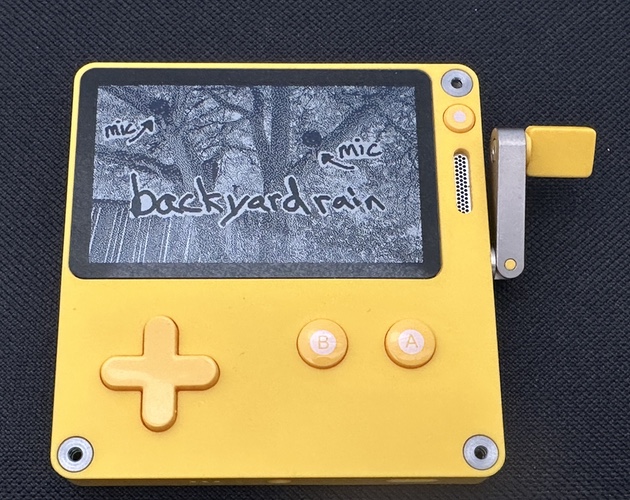Playdate development is easy and fun (2023-07-07)
I recently got a quirky little handheld gaming device, called Playdate. I had a fantastic early experience developing for it. It's gotten me more excited about programming than anything else in years. And... I don't understand exactly why. This is my attempt to think it through.

A Playdate gaming handheld. So small!
This was one of those supplychain delayed orders, so I'd mostly forgotten about it by the time it arrived. And while I was planning to use it for distraction gaming, I'm somehow finding myself developing software for it! I had no plans to make any games... but somehow the developer experience is so good, that I've almost accidentally started, and can't seem to stop now! This post is about the initial dev experience and how great it is.
The first evening I played with it, I posted this:
"Super impressed with the #playdate SDK. I'm a programer, but I've never done game dev. Had an idea for a... well more of a fidget toy than a game. An hour later and it's running on the physical device. Was able to merge two of the examples and find a few additional functions to call from the docs and ... done!?!
The Playdate devs have done really nice work. Docs are good, tooling is good, everything worked. Stellar first impression!"
the story
Let's walk through that in more detail. I got the device during a work week, fiddled with a few games and set it aside. A few evenings later, I thought...
"They have development tools for it, right? I wonder if I could make a logo spin?"
Not sure why I was thinking about that exactly, but... I decided to try. Opened the Playdate developer site and it looks like they have three options: Lua and C APIs with a local simulator, and an online authoring tool called Pulp.
I decided to go with Lua, since I've been meaning to learn it to script other software. Downloaded the SDK, installed, and poked around at the examples. Created a folder with a copy of PlaydateSDK/Examples/Game Template and that seemed to run. Started reading the reference docs, which are quite clear and to-the-point.
After getting that first thing running in the simulator, I spent about 45 minutes reading docs, poking at examples and searching the developer forums.
I'm recreating this from memory, but I think these are the main sources I used:
PlaydateSDK/Examples/Single File Examples/crank.lua- https://devforum.play.date/t/basic-crank-rotate-sprite/8422
Combine those into one program... and... with that, I had everything I needed.
"It's working?!?"
Not what I expected. I'm used to long research side quests and yak-shaving. I got something working on the device in an hour? This is fun. OK, and the crank on the side just feels good.
I have to admit that I did spend the next two hours fiddling with image dithering (for the 1-bit actually-only-black-and-white screen) and fiddling with crank response timing, adding additional button handlers, etc.
thoughts
OK, but... why was this so much easier to get started and more fun than I expected? After thinking about it and talking it over with colleages for a few days... I think... it's not magic, the Panic folks have done all the fundamentals really well.
Things that worked well for me (first time Playdate developer):
- I could choose between multiple tools which support different levels of abstraction and programming experience.
- The simualator works well and allows quick iterations.
- The reference docs are accurate, comprehensive, concise and ... crucially: all in one place. I just scrolled up and down the same page with an occasional search-in-page.
- The developer forums are full of useful posts.
- Constraints simplify. The device and APIs are very focused. It think it could be possible to... just learn them all. Most dev tools feel like they're growing faster than I can keep up.
- Seeing something you just made on a physical device in your hand just feels good.
- I'm of an age where 1-bit visuals are super nostalgic, so I'm sure that helps.
- And maybe most of all: fast feedback loops. In Lua at least, pretty much everything I tried just worked or failed right away. Edit, save, view, repeat. Once things are working well enough, it only takes 15-20 seconds to get that build from the simulator to the physical device.
your turn
I want everyone to experience this! ... but... today at least, they're backordered for many months. That said, the local dev tools and Pulp (online authoring tool) are free and work without a device. Consider playing around with them.
If you're at all curious (and can afford to), order one and forget about it until it arrives. Your future self will thank you.